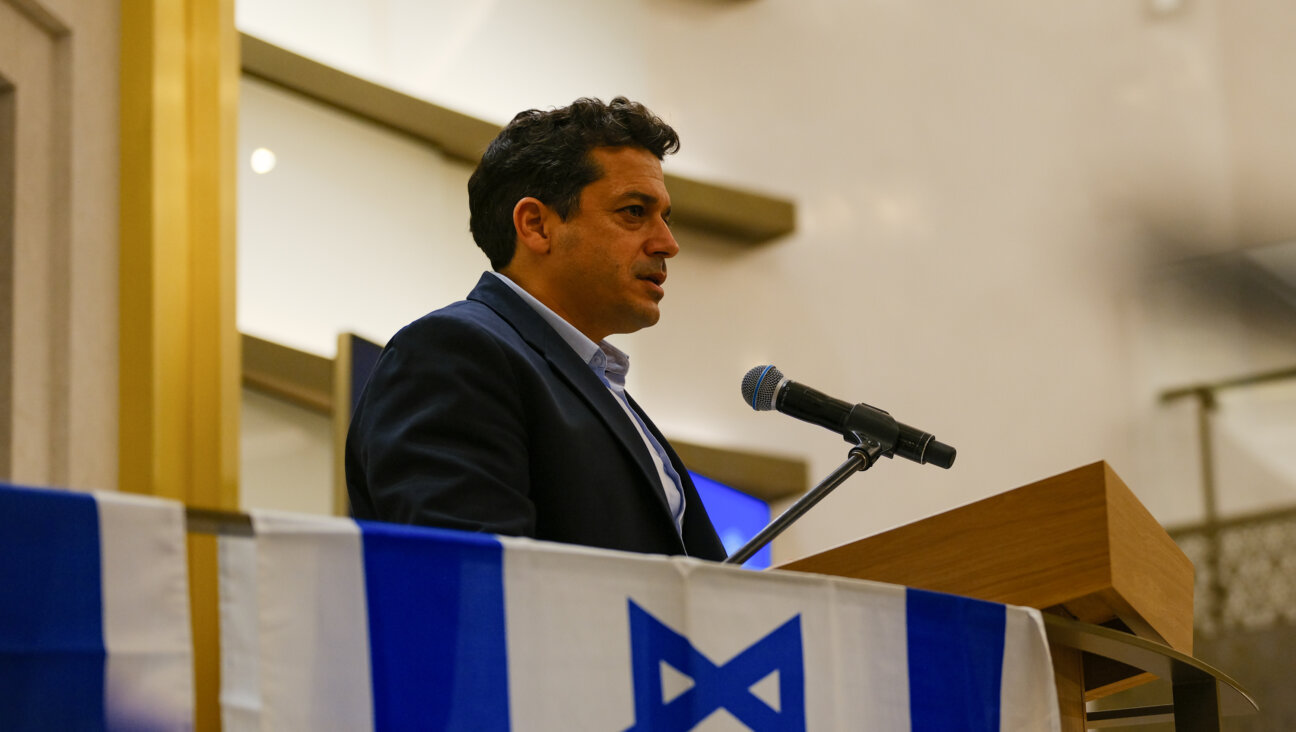Zohran Mamdani’s playbook for defusing antisemitism allegations
Mamdani sought to comfort as many Jewish voters as possible without meaningfully changing his position on Israel

Zohran Mamdani greets voters in New York City on June 24. Photo by Michael M. Santiago/Getty Images
Antisemitism Decoded is the Forward’s biweekly newsletter that helps you separate the signal from the noise and understand current debates over Jewish safety. Sign-up here.
In the aftermath of Zohran Mamdani’s resounding victory in New York City’s Democratic mayoral primary, I found myself wondering whether the 33-year-old state lawmaker and socialist developed a true playbook for disarming allegations of antisemitism that, in recent years, sunk several university presidents and members of Congress.
And I do think Mamdani cracked the code, but his playbook is not one that everyone can replicate.
Mamdani’s strategy really only works for a candidate answering to voters, whereas others accused of antisemitism are often judged by university boards, members of Congress, prosecutors and employers.
This distinction matters because elected officials often act like simply invoking the fight against antisemitism — as the White House has done in its campaigns against Harvard and Columbia — can turn a controversial policy into a political winner, even when the data doesn’t back that up. Recent polling found that if the university funding cuts were put to a vote, only 27% of voters would be in favor of them.
It’s no coincidence that Jewish opponents of Reps. Jamaal Bowman and Cori Bush focused most of their messaging on issues like infrastructure funding in their successful campaigns to unseat them, while limiting the slogan that “antisemitism is on the ballot” to a much smaller audience of Jews.
***
But that’s not to say that claims of antisemitism are irrelevant in political campaigns, especially in New York City, home to 730,000 Jewish adults who are up to 45% more likely to vote than the general population, according to a recent analysis by the Jewish Voter Resource Center.
Mamdani knew this and addressed it with outreach that suggested he understood Israel was a “threshold issue” for Jews.
That conceptual framework, popularized by the longtime Democratic pollster Jim Gerstein, holds that a candidate needs to meet a certain baseline level of support for Israel to win over Jewish voters. But beyond that “threshold,” Jews don’t vote based on Israel.
Mamdani seemed to recognize that different Jews have different thresholds, and that it was worth committing to the highest threshold he could possibly clear without meaningfully changing his politics: support for Israel’s “right to exist.”
In May, a scandal broke out over the fact that Mamdani had not co-sponsored two resolutions in the state legislature. One, commemorating Holocaust Remembrance Day, he still supported. But the other, celebrating Israel’s 77th anniversary, he did not.
Jews can brook serious criticism of Israel, but opposing Israel’s right to exist is a red line. A Gerstein poll in November found that 87% of Jewish voters thought that doing so is antisemitic, while a similar survey landed at 85%.
When reporters began asking Mamdani about this, he responded with a clever line: “I do support its right to exist as a state.”
The standard leftist line is variations of “no.” But Mamdani made the decision to meet an important threshold for Jewish voters, even as he seized on a loophole: Israel’s supporters understand the phrase to mean Israel’s right to exist as a Jewish state, though that’s often not explicitly stated, and when eventually asked about this Mamdani specified that he believed only that “Israel has a right to exist as a state with equal rights.”
In a campaign of soundbites, seizing on that distinction required wading into two conceptual morasses — and were his opponents supposed to say that Israel shouldn’t exist as a state with equal rights?
***
As I’ve written before, my sense is that for many Jews the real line between acceptable criticism of Israel and antisemitism comes down to vibe. That’s likely how Gerstein’s November poll found that nearly 80% of Jewish voters thought the campus protests against Israel were antisemitic, despite a far smaller share agreeing that anti-Zionism (54%) or accusing Israel of war crimes (41%) — what the majority of protesters were actually doing — was antisemitic.
Mamdani obviously fell well short of the threshold for many Jewish New Yorkers. But for those caught somewhere in the middle — like the roughly 25% who thought the protests were offensive but anti-Zionism is OK — Mamdani worked hard to assuage their fears, including his cross-endorsement with Brad Lander, the city’s Jewish comptroller with more mainstream views on Israel.
The crowd at Mamdani’s victory party breaking out in chants of “Brad! Brad! Brad!” when Lander arrived underscored the extent to which he – and presumably voters sharing Lander’s liberal Zionist views – were welcome in this coalition.
Mamdani also participated in UJA-Federation’s mayoral forum, hung his colorful campaign posters in Yiddish throughout Borough Park, sat for interviews with the Jewish press, and described Oct. 7 as a “horrific war crime” that, he told Stephen Colbert, made a Jewish friend of his afraid to attend Shabbat services in New York.
Compare that to Bush, a Squad member from St. Louis, who never managed to pair her harsh criticism of Israel with Mamdani’s sensitivity, refusing to speak to the Jewish press, meet with local Jewish organizations or reply to even friendly messages from rabbis in the city.
Or Bowman, who lost J Street’s endorsement after an appearance with Norman Finkelstein, where he praised the anti-Zionist Jewish academic who responded to Oct. 7 with “hallelujah.”
What is especially remarkable about Mamdani’s success is that he managed to deflect the antisemitism allegations without changing virtually any of his actual policy positions, which was no doubt infuriating for those who believed it was the positions themselves that were antisemitic.
But some of the establishment Jewish leaders I spoke with struck an equanimous tone after Mamdani’s victory, with one well-placed source who was not authorized to speak with the press telling me that he was open to working with Mamdani if he maintained the same tone that he had during the campaign.
“His true beliefs are really beyond the pale but maybe it’ll be more important for him to be a successful mayor and build bridges,” the source said. “I don’t know if the activist Zohran is going to be mayor or the candidate Zohran is going to be mayor.”
📚 GO DEEPER
- Why claims of antisemitism didn’t stop Zohran Mamdani (Forward)
- What a Mayor Mamdani would mean for New York Jews (Forward)
- OPINION | This is the beginning of the end of the 9/11 era (Forever Wars)
- OPINION | Zohran Mamdani’s Jewish problem (Reason)

















